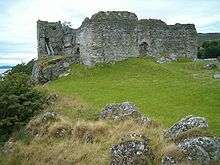Torquil MacNeill
Torquil MacNeill (Scottish Gaelic: Torcall MacNèill) was a mid sixteenth century clan chief.
In the sixteenth century, there was a clan of MacNeills centred on the Inner Hebridean island of Gigha. In about 1530, the chief of the clan, Niall MacNeill of Gigha, died without a male heir. While Niall's lands passed to his daughter, the chiefship of the clan passed over two her second cousin, Torquil MacNeill. In 1531, Torquil is recorded as the "chief and principale of the clan and surname of Maknelis". In 1542, a Crown grant of the clan lands was given to Niall, the illegitimate son of the deceased Niall MacNeill of Gigha. As late as 1553, Torquil was still regarded to be chief, for he is recorded as "principalis seu primarius tribus sive familie de MacNeille". In that year he is also described as being in very poor health. According to historian John Bannerman, it is likely that on Torquil's death, the chiefship of the clan officially passed over to Niall MacNeill of Gigha, who possessed the clan's lands.[1]

The nineteenth-century Scottish scholar William Forbes Skene believed that Torquil was not a member of either the clan on Gigha, or the clan on Barra (although Skene believed that the clans shared a common ancestry). Skene observed that in about 1530, both clans are known to have had chiefs of their own, and concluded that Torquil must have been chief of another (although a more senior chief). Skene also noted that Torquil was not designated with any property, and supposed that the chiefs of his clan were the hereditary keepers of Castle Sween. Earlier in 1472, a Hector Mactorquill Macneill is recorded as the keeper of the castle, and Skene considered this man to be the first record of a chief of Torquil's clan.[2]
Skene also noted that Torquil seems to have been the last of his line, and suggested that an heiress of his clan passed the hereditary possessions to the MacMillans, who are recorded in possession of the castle and certain surrounding lands. After the demise of Torquil, the most prominent chiefs of both the Gigha, and Barra clans, were those of Barra.[2]
References
- Footnotes
- ↑ Bannerman 1998: p. 34.
- 1 2 Skene 1902: pp. 248–250.
- Bibliography
- Bannerman, John (1998), "MacDuff of Fife", in Grant, Alexander; Stringer, K.J., Medieval Scotland: Crown, Lordship and Community: Essays presented to G.W.S. Barrow, Edinburgh: Edinburgh University Press, ISBN 978-0-585-06064-4
- Skene, William F. (1902), Macbain, Alexander, ed., The Highlanders of Scotland, Stirling: Eneas Mackay